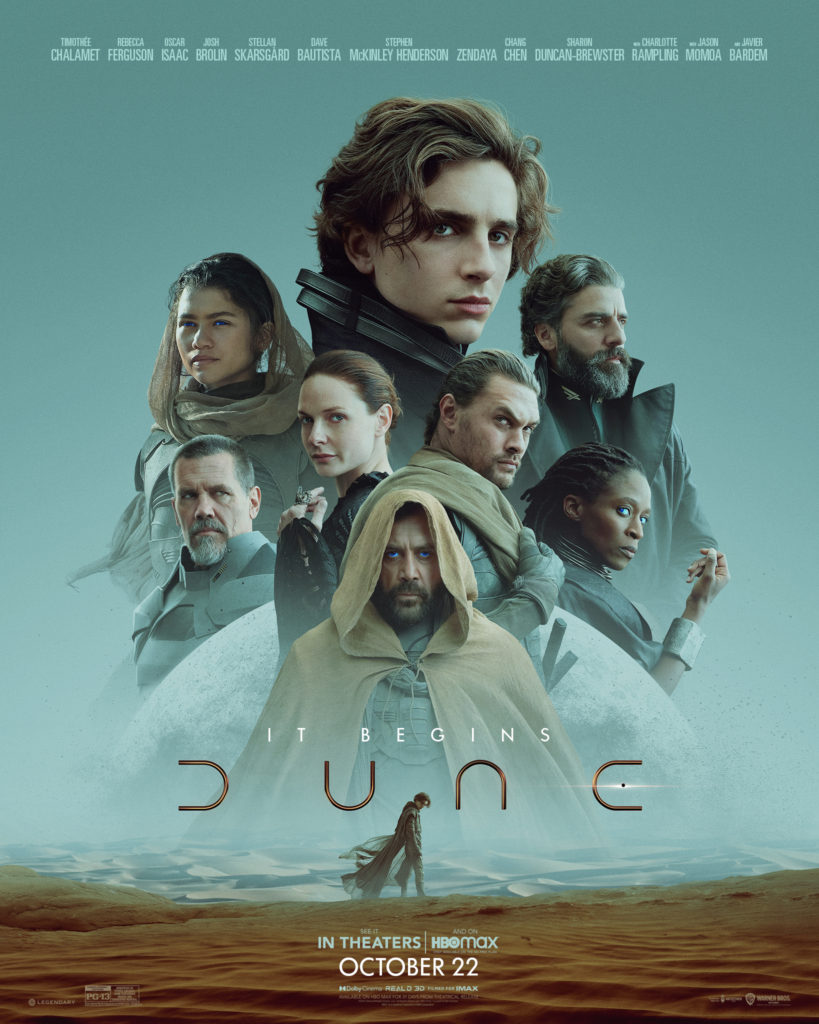
Dune is the most immersive and ambitious science fiction film since Blade Runner. Dune is long (2 hours and 35 minutes) and demanding, dropping the viewer into an information desert, crawling to find a voice-over oasis or searching the scorched horizon for an explanatory character to reveal the backstory. Wisely, Denis Villeneuve (who directed and co-wrote the screenplay along with John Spaihts and Eric Roth) takes the harder path. In place of water, he provides more sand, lovingly photographed and hauntingly scored.
Dune will have its detractors. It is incomplete, ambiguous, and indulgent. But the scale of the story, the grandeur of its visuals, and the richness of the fully-realized universe outweigh and overwhelm these complaints. If the second half of the story is made, and lives up to the first, Villeneuve will have helmed a cinematic masterpiece that will deserve a place alongside Lawrence of Arabia and The Lord of the Rings: epics that use the clash of cultures as a backdrop for small people to do large, wondrous things.
Based on the dense novel by Frank Herbert, Dune is the story of Paul Atreides (Timothée Chalamet), the heir to House Atreides, one of the most powerful fiefdoms in this galaxy. House Atreides has been granted the rule of Arrakis, a desert planet, was this universe’s version of “fly-over country” until a natural resource, spice, was discovered. Spice makes interstellar travel possible, and Arrakis’s sand is the most valuable commodity in existence.
The Emperor, unseen in the film, transfers control of Arrakis to the Atreides, much to the chagrin of the Harkonnens, the ruthless overlords who have controlled Arrakis for 80 years and have grown, literally and figuratively, fat during that span. Arrakis, though hot, hard, and inhospitable, is not barren. The Fremen have learned to survive in the climate. They existed in a constant state of conflict with the Harkonnens, while Duke Leto Atreides (Oscar Isaac) hopes to build an alliance with them.
Paul’s mother, Lady Atreides (Rebecca Ferguson) is part of a religious order, the Bene Gesserit, who sit near the imperial throne, possess mysterious powers, and operate their own networks of influence. Lady Atreides has been training Paul in the ways of the Bene Gesserit, while his father’s trusted military lieutenants Duncan Idaho (Jason Momoa) and Gurney Halleck (Josh Brolin) train him in combat. Well before he ever steps a foot in the sand, Paul is haunted by dreams of Arrakis and the Fremen, especially a young girl we eventually meet as Chani (Zendaya).
Villeneuve skillfully moves these pieces into place as the transition from Harkonnen to Atreides on Arrakis happens. What follows is operatic–not just as a series of tragedies, but in the lushness of its presentation. Photographed by Greig Fraser, Dune is visually unmatched. The size and complexity of ships, cities, and landscapes is overwhelming, but there was never a moment that felt computerized. Somehow, Fraser, and his fellow magicians, made every frame feel real.
The film’s score accompanies, and sometimes drives, the visuals. Hans Zimmer, the composer, manages to blend the familiar with the alien to create themes that describe each faction. Villeneuve suffocates some scenes with the music. A certain kind of viewer will find this frustrating, while others will find it invigorating. Count me in the latter group.
Dune, like most great science fiction, uses its setting as a backdrop to examine more contemporary or universal problems. Dune delves into themes of power and oppression. It is a meditation on the role of faith as an avenue to truth. It is about the conflict between corruption and nobility. Dune explores most of these matters in a tangential way, but their presence brings a weight that grounds the proceedings.
Dune is a great film. See it in a big theater on a big screen with big sound.
 Bert Wheeler
Bert Wheeler
 Jeff Haymond
Jeff Haymond
 Marc Clauson
Marc Clauson
 Mark Caleb Smith
Mark Caleb Smith
 Tom Mach
Tom Mach